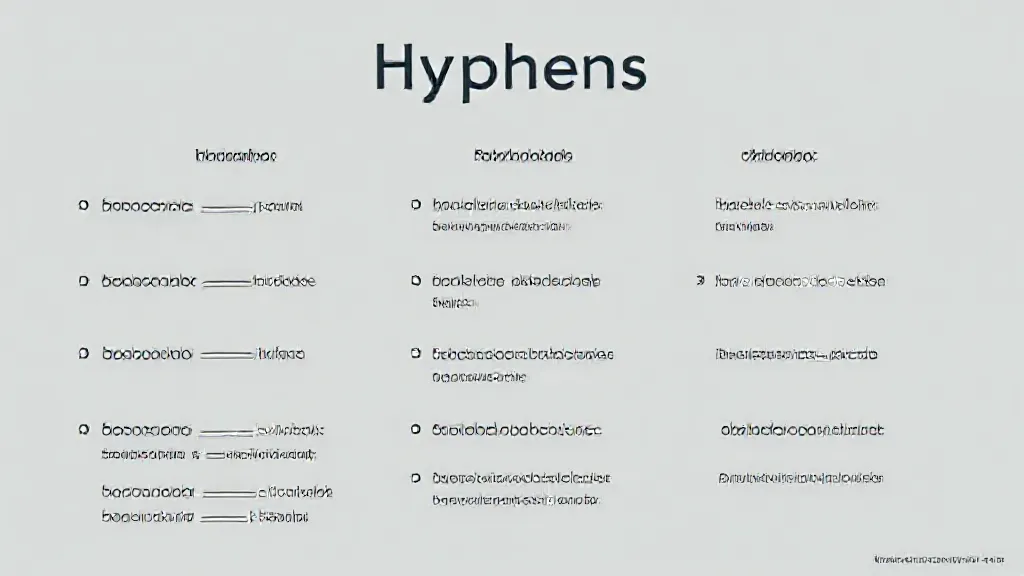Hyphens are small punctuation marks that play a significant role in the clarity and precision of written language. Despite their size, their correct usage can greatly influence the meaning of sentences. This article delves into where hyphens should be used correctly, providing a detailed exploration of their functions and common pitfalls in usage.
Understanding these rules not only enhances writing skills but also aids in effective communication.
Hyphens in Compound Modifiers
One of the primary uses of hyphens is in compound modifiers. A compound modifier occurs when two or more words are combined to modify a noun.
For example, in the phrase "well-known author," the hyphen connects "well" and "known" to indicate that they work together to modify "author." Without the hyphen, the phrase could be misinterpreted. It is essential to use hyphens in compound modifiers when they appear before the noun they modify, such as "high-speed train" or "full-time job.
" However, when the compound modifier follows the noun, the hyphen is typically omitted, as in "The author is well known."
Hyphens in Compound Nouns
Hyphens are also commonly used in compound nouns, where two or more words are combined to create a single noun. Examples include "mother-in-law," "check-in," and "runner-up.
" These combinations aid in conveying a specific meaning that might otherwise be unclear. It is important to note that some compound nouns can exist either with or without hyphens, but the hyphenated form often eliminates ambiguity. For instance, "small business" and "small-business owner" have different meanings, emphasizing the importance of using hyphens correctly.
Hyphens with Prefixes and Suffixes
The usage of hyphens with prefixes and suffixes can sometimes be confusing. Generally, hyphens are used when a prefix is added to a proper noun, such as "un-American," or to avoid awkward combinations, like "re-enter." In contrast, many prefixes, such as "pre," "post," and "sub," are typically not hyphenated when combined with standard words, as in "preheat" or "submarine.
" However, exceptions exist, and writers should be mindful of style guides that may dictate different rules for specific contexts.
Hyphenation in Numbers and Fractions
Hyphens are essential when writing out numbers and fractions in words. For instance, "twenty-one," "forty-five," and "three-fourths" all require hyphens.
This usage helps maintain clarity and ensures that the reader understands the numerical value being conveyed. When writing numbers that are not compound, such as "one thousand," no hyphen is needed. Understanding when to hyphenate numbers is crucial for effective communication in both academic and professional writing.
The Role of Hyphens in Clarity
One of the most significant functions of hyphens is to prevent misreading or misunderstandings. For example, consider the phrase "a little old lady." Without hyphens, it could be misinterpreted as "a little, old lady," altering the intended meaning.
Hyphens help clarify the relationship between words, ensuring that the reader comprehends the intended message. Writers should be vigilant in their use of hyphens, particularly in complex sentences where ambiguity may arise.
Common Mistakes in Hyphen Usage
Despite their importance, hyphen usage can be tricky, leading to common mistakes.
One frequent error is the overuse of hyphens, particularly in phrases where they are unnecessary. For example, "a high-quality product" is correct, but "a high quality product" is also acceptable without the hyphen. Writers should focus on clarity and only use hyphens when they enhance understanding.
Familiarity with common mistakes can help writers avoid pitfalls and improve their overall writing quality.
Hyphenation in Different Style Guides
Different style guides, such as the Chicago Manual of Style, APA, and MLA, have varying rules regarding hyphen usage. Understanding these guidelines is essential for writers, particularly in academic and professional contexts.
For example, the APA style has specific rules for hyphenating compound adjectives, while the Chicago Manual provides extensive guidance on hyphenating prefixes and suffixes. Writers should consult the appropriate style guide for their context to ensure compliance with the relevant rules.
Conclusion: The Importance of Mastering Hyphen Usage
In conclusion, mastering hyphen usage is crucial for clear and effective writing.
By understanding the various functions of hyphens, such as in compound modifiers, compound nouns, and clarity enhancement, writers can significantly improve their communication skills. Being aware of common mistakes and the rules outlined in different style guides further aids in this endeavor. As language evolves, so too does the importance of punctuation, making it essential for writers to stay informed and adaptable in their use of hyphens.
